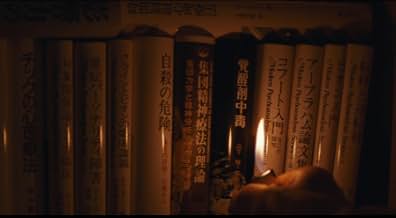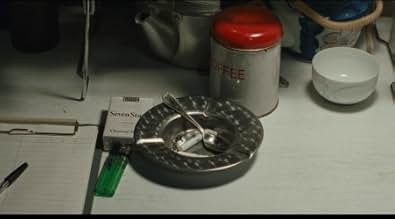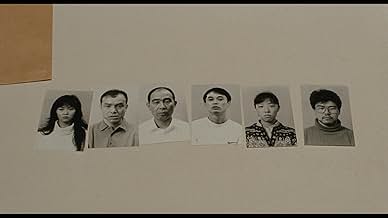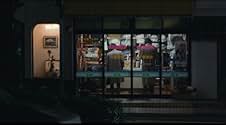Um detetive frustrado lida com o caso de vários assassinatos horripilantes cometidos por pessoas que não se lembram do que fizeram.Um detetive frustrado lida com o caso de vários assassinatos horripilantes cometidos por pessoas que não se lembram do que fizeram.Um detetive frustrado lida com o caso de vários assassinatos horripilantes cometidos por pessoas que não se lembram do que fizeram.
- Prêmios
- 9 vitórias e 2 indicações no total
Avaliações em destaque
In the wake of the sarin-gas attack mounted by the Aum Shinrikyo cult on the Tokyo subway system in 1995, horror films enjoyed a sudden spurt of popularity in Japan. Many of the films focus on hypnosis or media-induced violence, the fragile normalcy of modern life, and grisly deeds committed by seemingly ordinary citizens. This unnerving 1997 thriller, which seems like a direct response to the Aum Shinrikyo incident, offers a glimpse of how our own national cinema may absorb the blow of the Sept. 11 terrorist attacks. A rash of senseless murders wracks Tokyo; the victims have deep X-shaped gashes across their throats, and the killers (often their loved ones) are found in a daze. The only connection appears to be a mysterious drifter (Masato Hagiwara) who gets into random strangers' heads with a single, oft-repeated question: "Who are you?" What makes this subtle, quiet shocker so unsettling is the idea that everyone has secret resentments that render him or her hypnotically pliable--that everyone harbors some glimmer of murderous rage that can be exploited, whether by a drifter or by religious extremists. The writer-director, Kiyoshi Kurosawa, a prolific Japanese filmmaker who's developing a large cult following here, heightens the unease with buzzing soundtrack noise and eerie long takes that leave us consistently unprepared for the violence to come. And the last sequence will leave people arguing--it requires close attention, culminating in an ending even more disturbing in its implications than the conclusion of SEVEN.
WOW!!!! Now THAT was an EXCELLENT ending to a GREAT movie. It stuck with me for several hours after first watching it and the second time was no different. It had slow methodical pacing, but it was never boring. I, for one, appreciated the elliptical editing as it's just a filmmaker doing something different and being creative. Actually, it added to the hypnotic arc of the story. It didn't bother me whatsoever, although it wasn't nearly as effective in Kiyoshi's other great movie, "Kairo." Koji Yakusho was brilliant as troubled Detective Takabe and the mysterious drifter with hypnotic powers was very convincing as well. The use of hypnotism to get others to kill and rendering themselves soulless, was a refreshing take on the serial-killer subgenre, of which I love. Someone commented here that only people who "buy the mumbo jumbo" hypnotism storyline would like this film, and comments like those always bother me. Narrative films are not REAL LIFE, even the ones based on true stories. They are works of art, and try to tell us entertaining, comedic, frightning, and dramatic stories to keep the audience interested. I don't have to believe in the subjects their stories are telling me, nor do I believe they need to solve the world's problems. All I care is that they give me an interesting idea, an interesting story, with well-written dialogue, and if it ends with a bang. These, blended with great acting (now that's an area that needs convincing in film), great camera work, and an engaging score. Those are what make films interesting and "Kyua" aka "Cure" has all those qualities. Highly recommended.
A wave of gruesome murders confuses the police; the perpetrators all readily admit to their crime, but can't recall why they did it. The events are undoubtedly connected though, as each victim has a giant X carved into their neck. Two detectives begin questioning a drifter who seems connected to the murders, but run the risk of falling under whatever power he wields themselves.
The premise is interesting enough and director Kiyoshi Kurosawa certainly creates a dark mood, helped considerably by the eerie soundtrack and dilapidated set designs. Maybe on another night I would have clicked with this one more, but on the night I did see it, it was too slow and ponderous for me to truly enjoy. The link to the work of Franz Mesmer seemed like it was out of a comic book, and even in just rolling with that, I wish the drifter's role had remained a mystery for longer. The tension just wasn't there for me, making me think about holes in the story and how little these characters were developed. One that I wish I would have liked more, maybe next time.
The premise is interesting enough and director Kiyoshi Kurosawa certainly creates a dark mood, helped considerably by the eerie soundtrack and dilapidated set designs. Maybe on another night I would have clicked with this one more, but on the night I did see it, it was too slow and ponderous for me to truly enjoy. The link to the work of Franz Mesmer seemed like it was out of a comic book, and even in just rolling with that, I wish the drifter's role had remained a mystery for longer. The tension just wasn't there for me, making me think about holes in the story and how little these characters were developed. One that I wish I would have liked more, maybe next time.
It's not easy to give yourself over to this film, for like the unwilling victims' it portrays, it rather slowly and methodically casts its spell, whisking you farther and farther away from the comfortable rhythm and conventions of the crime thriller it appears to be on the surface.
Kyua's austere landscapes are in fitful turns picture postcard beautiful, mundane and mysterious. Much of the story unfolds in master shots, keeping you at a distance from the characters and affording the illusion of a comfortable intellectual detachment which it meticulously strips away scene by scene.
The plot is deceptively simple; a weary Japanese Homicide detective is investigating a series of grotesque murders. Each murder seems to have the same ritualistic pattern, yet in each case the culprit turns out to be an ordinary individual, dazed and unable to offer any motive for their horrific crime. Nothing seems to connect the murderers to each other, until the Detective picks up the trail of an amnesia afflicted drifter who seems unable to answer even the simplest questions about himself, yet displays a disconcerting ability to reflect any line of questioning about his own identity back upon the questioner. Time and again he returns to a question at the core of the mystery:
"Who are you?"
It seems more and more, as the drifter is passed from detective, to guard, to clinician to pyschiatrist, that this question is far more dangerous than anyone might have guessed.
Kyua is a model of subtlety and restraint. Although there's a significant amount of implied violence and several shocking scenes of murder, these aren't gratuitous. Kyua's particular genius is it's ability to transform it's urban Japanese landscapes and even the most common objects from familiar to suspect and eventually sinister: a length of piping, a flashing traffic sign, a blast furnace, the sound of ocean surf at night, a flickering lighter, a dark apartment lined with academic tomes, a puddle of spilled water, the letter X smeared on a wall, a deserted rundown building.
There are few filmmakers with the audacity and imagination to venture into the places Kyua wants to take you. Fincher, Lynch and Cronenberg come to mind as those who time and time again have shown their willingness, and perhaps compulsion to return to the unsettling territory of perception, identity, and the boundary between normalcy and psychosis. If the director's first name were only David (it's not, his name is Kiyoshi Kurosawa) we'd have the makings of a good conspiracy theory here.
The film was released in 1997 but only recently has made it's way to western shores, and US distribution by Cowboy Pictures, and has wound its way inevitably to cable networks like Sundance. It's cast includes Koji Yakusho as the detective Takabe. Fans of Japanese cinema will recognize this fine actor from his award winning roles in "Shall we Dance" and "The eel".
Kyua isn't the type of visceral immediate drama that the average suspense film provides. If you can put aside your preconceived notions and allow it to unfold in it's own time, I suspect you will find the questions it asks and secrets it reveals to be all the more disquieting, problematic and in the end profound. Many critics have lined up to call this film a masterpiece, and pegged Kurosawa as one of a number of japanese directors worth watching.
Kyua's austere landscapes are in fitful turns picture postcard beautiful, mundane and mysterious. Much of the story unfolds in master shots, keeping you at a distance from the characters and affording the illusion of a comfortable intellectual detachment which it meticulously strips away scene by scene.
The plot is deceptively simple; a weary Japanese Homicide detective is investigating a series of grotesque murders. Each murder seems to have the same ritualistic pattern, yet in each case the culprit turns out to be an ordinary individual, dazed and unable to offer any motive for their horrific crime. Nothing seems to connect the murderers to each other, until the Detective picks up the trail of an amnesia afflicted drifter who seems unable to answer even the simplest questions about himself, yet displays a disconcerting ability to reflect any line of questioning about his own identity back upon the questioner. Time and again he returns to a question at the core of the mystery:
"Who are you?"
It seems more and more, as the drifter is passed from detective, to guard, to clinician to pyschiatrist, that this question is far more dangerous than anyone might have guessed.
Kyua is a model of subtlety and restraint. Although there's a significant amount of implied violence and several shocking scenes of murder, these aren't gratuitous. Kyua's particular genius is it's ability to transform it's urban Japanese landscapes and even the most common objects from familiar to suspect and eventually sinister: a length of piping, a flashing traffic sign, a blast furnace, the sound of ocean surf at night, a flickering lighter, a dark apartment lined with academic tomes, a puddle of spilled water, the letter X smeared on a wall, a deserted rundown building.
There are few filmmakers with the audacity and imagination to venture into the places Kyua wants to take you. Fincher, Lynch and Cronenberg come to mind as those who time and time again have shown their willingness, and perhaps compulsion to return to the unsettling territory of perception, identity, and the boundary between normalcy and psychosis. If the director's first name were only David (it's not, his name is Kiyoshi Kurosawa) we'd have the makings of a good conspiracy theory here.
The film was released in 1997 but only recently has made it's way to western shores, and US distribution by Cowboy Pictures, and has wound its way inevitably to cable networks like Sundance. It's cast includes Koji Yakusho as the detective Takabe. Fans of Japanese cinema will recognize this fine actor from his award winning roles in "Shall we Dance" and "The eel".
Kyua isn't the type of visceral immediate drama that the average suspense film provides. If you can put aside your preconceived notions and allow it to unfold in it's own time, I suspect you will find the questions it asks and secrets it reveals to be all the more disquieting, problematic and in the end profound. Many critics have lined up to call this film a masterpiece, and pegged Kurosawa as one of a number of japanese directors worth watching.
The only time I can recall being as spooked by a film was when my parents took me to see "Hangover Square" - a gothic Jack the Ripper thriller - when I was 8 years old. I guess they couldn't find a baby-sitter. That took me about a year to get over, a low-key, all-too-realistic chiller about the banality of insanity.
"Cure" is such a perfect depiction of madness that just about every shot could be framed & hung in a gallery. You can't analyze this one, it doesn't follow a cartesian line of logic; nor does it blast you with halloweenish surprises in the style of Elm Street & its knock-offs. This has far deeper & subtler impact. I found as I relaxed into this film that images of recurring dreams & nightmares I've had since childhood arose & blended into what I was watching. Can't get much creepier than that.
That said, the images & emotions that this film evokes are on a very high level of poetic art. One of the most impressive elements of "Cure" is the director's ability to convey the magnetic manipulative appeal of Mamiya - surely one of the scariest things in real life & very difficult to convincingly convey on screen.
"Cure" is such a perfect depiction of madness that just about every shot could be framed & hung in a gallery. You can't analyze this one, it doesn't follow a cartesian line of logic; nor does it blast you with halloweenish surprises in the style of Elm Street & its knock-offs. This has far deeper & subtler impact. I found as I relaxed into this film that images of recurring dreams & nightmares I've had since childhood arose & blended into what I was watching. Can't get much creepier than that.
That said, the images & emotions that this film evokes are on a very high level of poetic art. One of the most impressive elements of "Cure" is the director's ability to convey the magnetic manipulative appeal of Mamiya - surely one of the scariest things in real life & very difficult to convincingly convey on screen.
Você sabia?
- Erros de gravação(at around 51 mins) In Japan, they drive on the left side of the road and the steering wheel is on the right side of the car. In every scene in this picture that's the case - except one. When the detective leaves in his car to go to the hospital because Mamiya has turned up there, the steering wheel is on the left and he drives on the right side of the road.
- Citações
Kunio Mamiya: All the things that used to be inside of me... now they are all outside.
- Cenas durante ou pós-créditosThere are no opening credits, with the exception of the movie's title.
- ConexõesEdited into Cure: or How to Be Happy While Saving the Species (2017)
Principais escolhas
Faça login para avaliar e ver a lista de recomendações personalizadas
- How long is Cure?Fornecido pela Alexa
Detalhes
Bilheteria
- Orçamento
- JP¥ 1.000.000 (estimativa)
- Faturamento bruto mundial
- US$ 232.465
- Tempo de duração1 hora 51 minutos
- Cor
- Mixagem de som
- Proporção
- 1.85 : 1
Contribua para esta página
Sugerir uma alteração ou adicionar conteúdo ausente


![A mesmerising and hypnotic psychological thriller from Kiyoshi Kurosawa...
Released to critical acclaim in both the East and the West, CURE was a breakthrough film for director Kiyoshi Kurosawa, a nerve shredding thriller about the hunt for a serial killer in a bleak and decaying Tokyo.
A series of murders have been committed by ordinary people who claim to have had no control over their horrifying actions. Following the only link - a mysterious stranger who had brief contact with each perpetrator and their victim - detective Kenichi Takabe (Kôji Yakusho, 13 ASSASSINS, TOKYO SONATA) places his own sanity on the line as he tries to end the wave of inexplicable terror.
Described as one of the greatest films of all time by Bong Joon-ho (THE HOST, SNOWPIERCER), CURE is a deeply unsettling masterpiece of its genre, and has shockingly been unavailable on home video in the UK until now. The Masters of Cinema Series is proud to present Cure in a special Dual Format edition.
CURE [Kyua], Kiyoshi Kurosawa's mesmerising and hypnotic psychological thriller, is released on home video for the first time in the UK as part of The Masters of Cinemas Series in a Dual Format edition on 23 April 2018.](https://m.media-amazon.com/images/M/MV5BZjdlYmU3YTktZTQzNi00YWE5LTgzZjQtYmI3OTRkNTQyYTkxXkEyXkFqcGdeQXVyMTg2NTc4MzA@._V1_QL75_UX500_CR0)






















